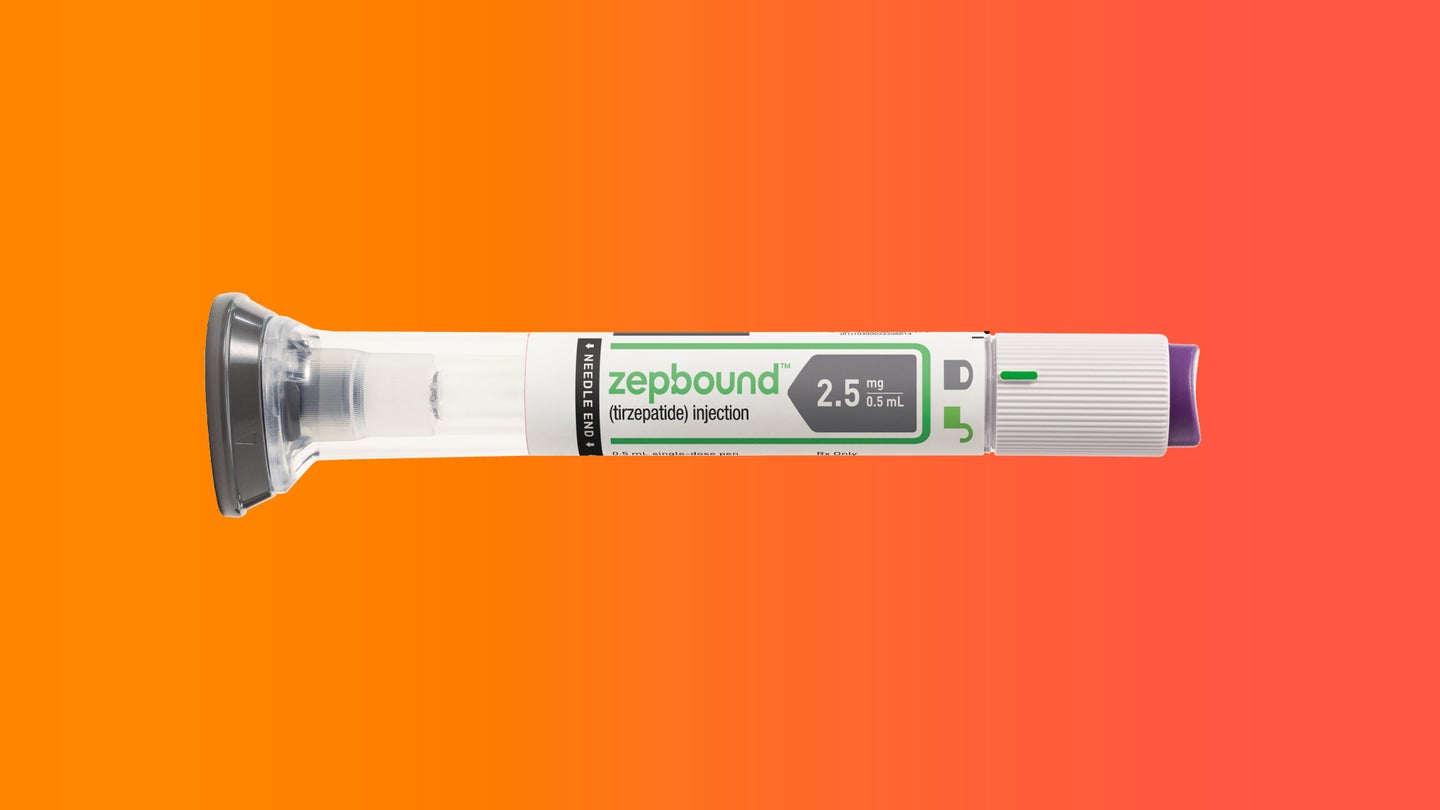A new injectable weight-loss medication, Zepbound, has recently received FDA approval. How does it measure up to Ozempic, a popular diabetes and weight-loss drug?
In recent years, drugs like Ozempic, Wegovy, and Mounjaro have demonstrated remarkable effectiveness in weight loss and diabetes management. Their continuing popularity among those seeking weight loss or diabetes management has spurred fierce rivalry among pharmaceutical companies to develop the next breakthrough weight-loss drug.
On November 8, another novel weight-loss medication, Zepbound (tirzepatide), obtained FDA approval. This new drug, manufactured by Eli Lilly, is intended for chronic weight management in obese or overweight adults with at least one obesity-related health condition, such as high cholesterol, type 2 diabetes, or high blood pressure. While the drug’s name differs, its active component is the same as that found in Mounjaro.
But how does Zepbound compare to Ozempic and other medications currently leading the weight-loss drug market?
What does Zepbound do?
Zepbound is a new injectable weight-loss medication that was recently approved by the FDA. It is manufactured by Eli Lilly and Company and is intended for chronic weight management in adults with obesity or overweight and who also have at least one weight-related health condition such as high cholesterol, type 2 diabetes, or high blood pressure.
Zepbound works by activating two hormone receptors in the intestines, GIP (glucose-dependent insulinotropic polypeptide) and GLP-1 (glucagon-like peptide-1). These receptors play a role in regulating appetite and blood sugar levels. When activated, they help to reduce appetite and increase energy expenditure.
Zepbound is administered by injection once a week and comes in six different doses, from 2.5 to 15 mg. In clinical trials, people without diabetes who took the highest dose of Zepbound while also engaging in a diet and exercise plan lost an average of 48 pounds over a 72-week period. Those who took the lowest dose lost an average of 34 pounds.
Zepbound’s active ingredient, tirzepatide, is different from the active ingredients in other semaglutide-based weight loss/diabetes drugs such as Ozempic and Wegovy. Semaglutide is a GLP-1 agonist, while tirzepatide is a dual agonist that acts on both GLP-1 and GIP receptors.
Zepbound is a promising new treatment for people who are struggling to lose weight and who also have a weight-related health condition. It is important to note that Zepbound is a prescription medication and should only be used under the supervision of a doctor.
How Zepbound Works
Zepbound works by stimulating the release of two hormones: glucagon-like peptide-1 (GLP-1) and glucose-dependent insulinotropic polypeptide (GIP). These hormones help to regulate appetite and blood sugar levels. When activated, they help to reduce appetite and increase energy expenditure.
Benefits of Zepbound
Zepbound has a number of potential benefits over other weight-loss drugs, including:
- Lower list price: Zepbound has a list price of $1,059.87 before insurance, which is 20% lower than the list price of 2.4 mg semaglutide injections.
- Effective for weight loss: In clinical trials, Zepbound has been shown to be as effective as Ozempic and Wegovy for weight loss.
- May improve blood sugar control: Zepbound may also help to improve blood sugar control in people with type 2 diabetes.
Difference Between Zepbound and Mounjaro
Zepbound and Mounjaro are essentially the same medication, but they are marketed for different purposes. Zepbound is approved for chronic weight management in adults with obesity or overweight and who also have at least one weight-related health condition such as high cholesterol, type 2 diabetes, or high blood pressure. Mounjaro, on the other hand, is approved for the treatment of type 2 diabetes in adults.
The reason for the different marketing approvals is due to FDA labeling regulations. In order for a new drug to be approved for a particular indication, it must undergo clinical trials that demonstrate its safety and efficacy for that specific condition. Zepbound and Mounjaro both contain the same active ingredient, tirzepatide, but the clinical trials for each medication focused on different outcomes. The trials for Zepbound showed that it was effective for weight loss, while the trials for Mounjaro showed that it was effective for lowering blood sugar levels in people with type 2 diabetes.
The drug manufacturer, Eli Lilly and Company, made the decision to market Zepbound for weight loss and Mounjaro for diabetes in order to maximize its patent protection. By having two separate drugs with the same active ingredient, Eli Lilly can potentially extend the length of time that it has exclusive rights to market the drug.
In summary, Zepbound and Mounjaro are the same drug, but they are approved for different purposes due to FDA labeling regulations and patent protection considerations.
Is Zepbound more effective than Ozempic or Wegovy?
Dr. Mitchell Roslin, a board-certified bariatric surgeon, believes that all four medications — Ozempic, Wegovy, Mounjaro, and Zepbound — are highly effective for weight loss. However, clinical trials suggest that Mounjaro, which shares the same active ingredient as Zepbound, might be slightly more effective.
Despite their effectiveness, Dr. Roslin cautions that these medications may not be the best option for everyone. He points out that most participants in the clinical trials for these drugs had class I or class II obesity, not severe obesity (class III obesity).
For individuals with severe obesity, Dr. Roslin suggests that these medications may not be sufficient. He emphasizes that long-term use of these drugs is essential for maintaining weight loss. If individuals discontinue the medication, they are likely to regain the weight they lost due to metabolic compensation, a phenomenon that occurs when the body adjusts to reduced food intake.
Dr. Roslin explains that metabolic compensation arises from the interplay between the sympathetic and parasympathetic nervous systems. In individuals with obesity, the sympathetic nervous system is overactive, leading to increased heart rate and blood pressure. Conversely, when individuals lose weight, the parasympathetic nervous system becomes more active, promoting weight gain.
While bariatric surgery leaves behind anatomical changes that can limit food intake to some extent, discontinuing weight-loss medications often leads to weight regain.
In conclusion, while weight-loss medications like Ozempic, Wegovy, Mounjaro, and Zepbound can be effective, they may not be suitable for everyone, particularly those with severe obesity. Dr. Roslin stresses the importance of long-term medication use and the potential for weight regain upon discontinuation.
Potential Side Effects of Zepbound

Zepbound, like other medications in its class, can cause a range of side effects, including nausea, diarrhea, vomiting, constipation, stomach discomfort, injection site reactions, fatigue, allergic reactions, burping, hair loss, and gastroesophageal reflux disease (GERD).
In animal studies, Zepbound has been linked to the development of thyroid C-cell tumors. While the potential for this to occur in humans is unclear, prescribing information for Zepbound also includes warnings about the potential for pancreatitis, low blood sugar, acute kidney injury, specific types of retinal damage, and suicidal thoughts or behaviors.
Despite these potential side effects, Dr. Mitchell Roslin, a board-certified bariatric surgeon, believes that the benefits of weight-loss medications like Zepbound often outweigh the risks. He emphasizes that obesity is a chronic and complex disease with far-reaching health consequences.
“Obesity is a systemic disease,” Dr. Roslin explains. “Studies have shown that people with obesity are physiologically 12 years older than their chronological age.”
He further points out that individuals with severe obesity are at a significantly increased risk of developing serious health conditions, including heart disease, stroke, type 2 diabetes, and certain types of cancer.
“People who have an elevated BMI tend to die younger,” Dr. Roslin observed. “In fact, there are very few heavy people in nursing homes. Obesity is a deadly disease.”
Dr. Roslin acknowledges that weight-loss medications like Zepbound can cause side effects, but he believes that these risks are often outweighed by the potential health benefits of achieving and maintaining a healthy weight.
“Yes, these medications have risks,” he concludes. “But these risks are less than the risks of having severe obesity and metabolic dysfunction.“
How Much Does Zepbound Cost?
Eli Lilly expects Zepbound to enter the United States market by the end of 2023 with a list price of $1,059.87 before insurance. This is 20% lower than the cost of 2.4 mg semaglutide injections. However, individuals whose insurance covers Zepbound may be eligible for a monthly or three-month prescription for as low as $25.
For those with insurance plans that do not cover the medication, the cost may be as low as $550 for a one-month prescription. This is still significantly lower than the list price, and Eli Lilly estimates that it represents a 50% discount.
What Does the Future Hold for Weight-Loss Medications?
Individuals seeking weight-loss medications may have more options in the near future. Novo Nordisk, for instance, plans to conduct a phase 3 trial on its newest weight-loss drug, CagriSema. CagriSema combines an investigational medication called cagrilintide with a fixed dose of Wegovy.
Additionally, mazdutide, a dual agonist for GLP-1 and GCGR receptors developed by a Chinese pharmaceutical company, has demonstrated promising results in phase 2 clinical trials.
Despite the promising developments in weight-loss medications, there is still much to be learned about their long-term effects. Dr. Mitchell Roslin, a board-certified bariatric surgeon, emphasizes that more research is needed in this area.
One potential concern is that the high cost of these medications in the United States may lead some people to discontinue their treatment, potentially resulting in weight regain. Dr. Roslin believes that this could lead to an increased demand for bariatric surgery as individuals seek more permanent weight-loss solutions.
Overall, the future of weight-loss medications is promising, with new options emerging and existing medications showing continued efficacy. However, more research is needed to fully understand the long-term effects of these drugs and to address potential barriers to access, such as cost.
Who Should Consider Zepbound
Zepbound is an option for adults with obesity (BMI 30 or higher) or overweight (BMI 27 or higher) who also have at least one weight-related health condition, such as high cholesterol, type 2 diabetes, or high blood pressure.
Overall, Zepbound is a promising new weight-loss medication that has the potential to be a more affordable option for some people. However, it is important to talk to your doctor before starting any new medication, including Zepbound.
In addition to Zepbound, there are a number of other promising weight-loss medications in development. These medications target different receptors and have different mechanisms of action. As a result, they may offer new options for people who have not been successful with other weight-loss medications.
The future of weight-loss medications is bright. With so many new drugs in development, there is hope that more people will be able to lose weight and keep it off.
Continue to check our website for more articles of this kind. And, please use our comment section as well, we would love to hear from you.









